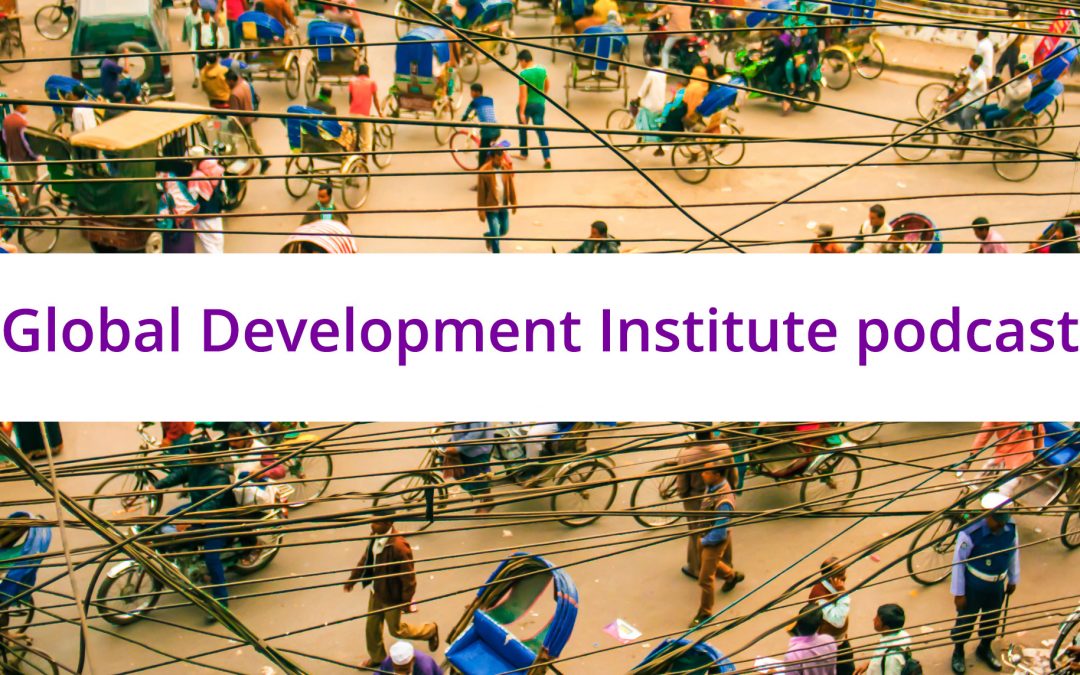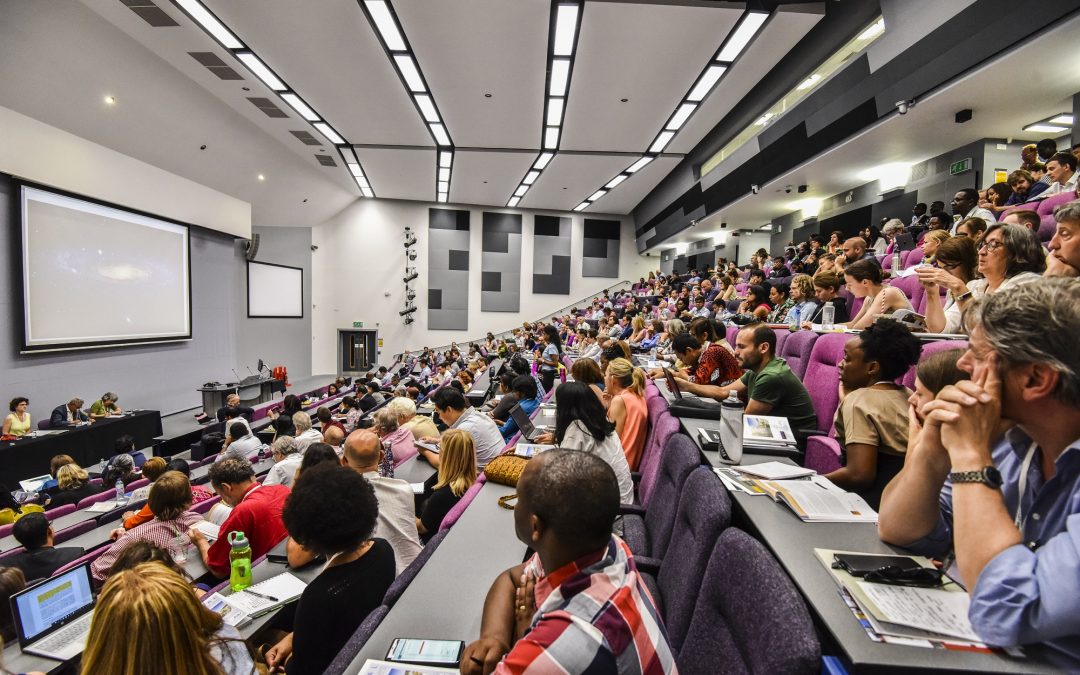
In Conversation: Armando Barrientos on social assistance
In this episode Chris Jordan, GDI’s Communications & impact Manager, talks to social assistance expert Professor Armando Barrientos. They discuss why Armando decided to specialise in social assistance and how it has changed over the last 20 years. Professor Barrientos also explains his new social assistance explorer which is the first database to bring together data on low and middle income countries and allow researchers to study and compare programmes at a cross-national, regional and global basis. Finally Armando looks forward to how he thinks social assistance will develop over the next five to ten years.

Digitally removing the middleman for development: Trouble brewing in East African tea?
Chris Foster, Presidential Fellow at the Global Development Institute,
One of the benefits often associated with digital technologies is the potential for disintermediation – or put more simply “cutting out the middleman”. This concept forms the basis for many hopes for development around digital technologies [1].
In the early days of digital technologies, it was found that they often failed to cut out the middleman due to the “digital divide” where digital skills, infrastructure quality and cost limited the use of technologies in smaller firms. But as firms have adopted technologies and with appropriate applications these foundational claims for digital development are important to revisit. read more…

The “global Britain” report: rule-breaking in foreign aid will not strengthen UK soft power
By Heiner Janus, German Development Institute / Deutsches Institut für Entwicklungspolitik (DIE) and PhD researcher at the Global Development Institute and Dr. Niels Keijzer, DIE
A new report on the future of “Global Britain” proposes several radical reforms of the UK’s spending on international development. Apart from suggesting major cuts in the aid budget, the report calls for broadening the definition of aid, diverting funds to peacekeeping and integrating the Department for International Development (DfID) into the Foreign Office.
The report, “Global Britain: A Twenty-First Century Vision”, was written by Bob Seely, a Tory MP and James Rogers, a member of the Henry Jackson Society think tank. It informs a Foreign Office review headed by Foreign Secretary Jeremy Hunt on the UK’s geopolitical role after leaving the European Union. In a foreword, Boris Johnson states that it is time to “turbo charge” Britain’s global reach and influence.

Commonwealth Distance Learning Scholarships
The Global Development Institute (GDI) is pleased to announce the availability of ten scholarships for distance learning, funded by the Commonwealth Scholarships Commission (CSC).
These are for applicants from developing Commonwealth countries, covering all tuition fee costs for the MSc in Management and Information Systems (Distance Learning), commencing in January 2020. read more…

GDI Lecture: development states with Stephan Haggard
Listen or watch Professor Stephan Haggard, UC SanDiego, discusses development states. You can download Stephan’s new book on developmental states for free until 14 Feb.
Listen or watch to the lecture in full below. read more…

GDI Lecture: What social network analysis can tell us about multi-stakeholder partnerships with Moira Faul & Jordan Tchilingirian
Listen or watch Moira V. Faul, Université de Genève, Switzerland and Jordan Tchilingirian, University of Bath, talk about ‘What social network analysis can tell us about multi-stakeholder partnerships’
Listen or watch to the lecture in full below. read more…

Hrishipara daily financial diaries: Tracking transactions, understanding lives part 2
Since May 2015 we have been recording the daily money transactions of up to 70 households living near a small market town in central Bangladesh. These ‘daily financial diaries’ shed light on the money-management behaviour of low-income households, described in papers which can be found on the project’s website. Up to now we have explored matters that face all our ‘diarists’, such as savings and credit, income and expenditure, health, and education.
‘Tracking transactions, understanding lives’ is a new series focusing on individual diarists. We aim to create vivid pictures that give readers a sense of what these lives are like. We hope this will help researchers and activists design better interventions for low-income households. read more…

The roles of the state in global value chains: the growing debate and agenda
By Rory Horner and Matthew Alford, January 2019
In a new paper in the GDI Working Paper Series we argue that the state-GVC nexus is, and will continue to be, especially significant in shaping development outcomes.
Research on global value chains (GVCs) has broken with state-centric approaches to understanding development, providing a more contemporary perspective on trade, industrial organisation and development outcomes. Partly based on a belief that little else was possible in a liberal economic context, the key emphasis in research on GVCs (and related global production networks (GPNs)) has been on how states facilitate GVCs – including both domestic firms and global lead firms. Yet other roles of regulator, producer (state-owned enterprises) and buyer (public procurement) are significant, and are now attracting growing attention.
How can we eradicate poverty by 2030?
The Project Syndicate created a video on the research done by Antonio Savoia and Niaz Asadullah on whether state capacity made an impact on achieving the MDGs.
- Download their original open access research paper
- Read commentary on World Economic Forum.
Note: This article gives the views of the author/academic featured and does not represent the views of the Global Development Institute as a whole.

Call for papers for Effective States and Inclusive Development conference on ‘rethinking the politics of development’
We are delighted to announce a flagship international conference convened by Effective States and Inclusive Development research centre, Global Development Institute, The University of Manchester.
Confirmed plenary speakers include world leading experts Anne Marie Goetz (New York), Merilee Grindle (Harvard), Lant Pritchett (Harvard), James Robinson (Chicago), Prerna Singh (Brown) and E. Gyimah-Boadi (Afrobarometer, Ghana).
Pratap Mehta (Ashoka), Dan Slater (Michigan ), are to be confirmed.
From Politics to Power? Rethinking the politics of development 9-11 September 2019, Manchester, UK
Politics was finally brought into the mainstream of international development around a decade ago. However, whilst most development academics and agencies accept that politics plays a central role in shaping development in the Global South, the incorporation of politics within development theory and practice remains partial and subject to backsliding. This international conference will take stock of what work on the politics of development has achieved to date, identify further opportunities for incorporating the full range of scholarship on politics and development, and set out future research agendas for the field.
This flagship conference will showcase the findings of the Effective States and Inclusive Development research centre (ESID), which has been researching the politics of state capacity and elite commitment to development since 2011. ESID findings will be presented and debated alongside the much broader range of research into the politics of development.
